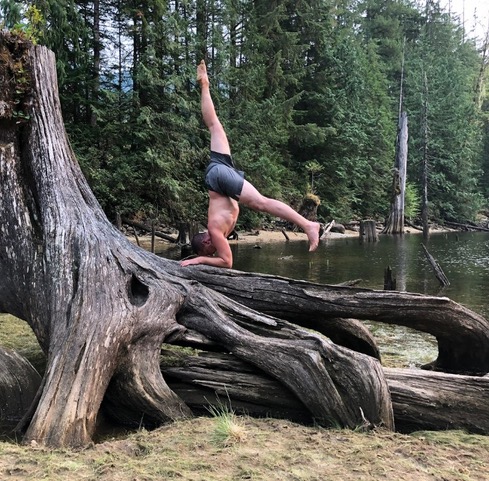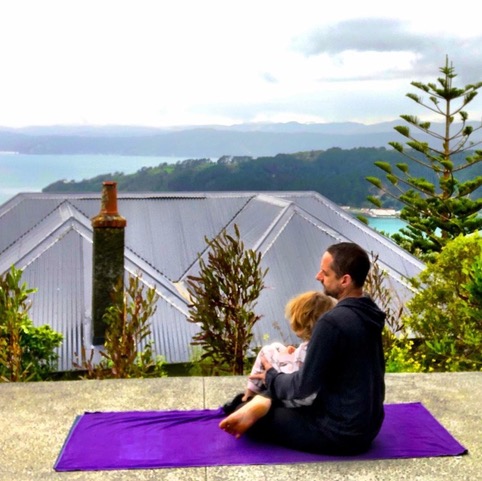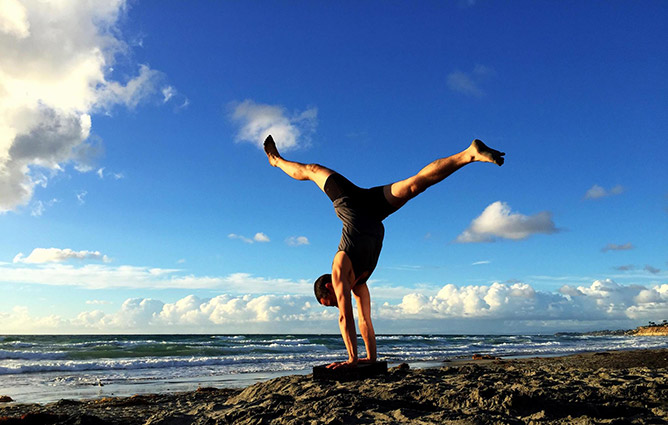Q&A with Noah Mazé
Noah Mazé recently sat down with an editor of yoga international and answered some questions about yoga, his yoga practice, teaching yoga and life in general.
If you could be remembered for one thing what would it be?
I would be remembered for being an endlessly curious yogi, intrepid adventurer and passionate educator who endeavoured to integrate yogic teachings into modern life with ferocity and compassion. Is all that one thing??
What top three things are on your bucket list?
Top three things on my bucket list…not necessarily in this order: I want to visit the poles of this planet and explore them via dog sled. Go on Ayyappa Yatra and other pilgrimages in South India, Varanasi and the Himalaya with my teacher. Go to culinary school, not to become a chef, but for my own interests and hobby.
What’s your favourite quote?
For a short quote (not sure who it’s from) “Do you want to be right? Or do you want to be happy?”
For a long quote, I really love this advice from one of Christopher Hitchens’ essays in Letter to a Young Contrarian:
 “However, in the interval between 1968 and 1989 – in other words, in that period where many of the revolutionaries against consumer capitalism metamorphosed into “civil society” human-rights activists – there were considerable interludes of stasis. And it was in order to survive those years of stalemate and realpolitik that a number of important dissidents evolved a strategy for survival. In a phrase, they decided to live “as if”.
“However, in the interval between 1968 and 1989 – in other words, in that period where many of the revolutionaries against consumer capitalism metamorphosed into “civil society” human-rights activists – there were considerable interludes of stasis. And it was in order to survive those years of stalemate and realpolitik that a number of important dissidents evolved a strategy for survival. In a phrase, they decided to live “as if”.
Vaclav Havel, then working as a marginal playwright and poet in a society and state that truly merited the title of Absurd, realised that “resistance” in its original insurgent and militant sense was impossible in the central Europe of the day. He therefore proposed living “as if” he were a citizen of a free society, “as if” lying and cowardice were not mandatory patriotic duties, “as if” his government had signed (which it actually had) the various treaties and agreements that enshrine universal human rights. He called this tactic the “power of the powerless” because, even when disagreement is almost forbidden, a state that insists on actually compelling assent can be relatively easily made to look stupid. At around the same time, and alarmed in a different way by many of the same things (the morbid relationship of the cold war to the nuclear arms race), Professor EP Thompson proposed that we live “as if” a free and independent Europe already existed.
The “People Power” moment of 1989, when whole populations brought down their absurd rulers by an exercise of arm-folding and sarcasm, had its origins partly in the Philippines in 1985, when the dictator Marcos called a “snap election” and the voters decided to take him seriously. They acted “as if” the vote were free and fair, and they made it so. In the late Victorian period, Oscar Wilde – master of the pose but not a mere poseur – decided to live and act “as if” moral hypocrisy were not regnant. In the Deep South in the early 1960s, Rosa Parks decided to act “as if” a hardworking black woman could sit down on a bus at the end of the day’s labour. In Moscow in the 1970s, Aleksandr Solzhenitsyn resolved to write “as if” an individual scholar could investigate the history of his own country and publish his findings. They all, by behaving literally, acted ironically. In each case, as we know now, the authorities were forced first to act crassly and then to look crass, and eventually to fall victim to stern verdicts from posterity. However, this was by no means the guaranteed outcome, and there must have been days when the “as if” style was exceedingly hard to keep up.
All I can recommend, therefore (apart from the study of these and other good examples), is that you try to cultivate some of this attitude. You may well be confronted with some species of bullying or bigotry, or some ill-phrased appeal to the general will, or some petty abuse of authority. If you have a political loyalty, you may be offered a shady reason for agreeing to a lie or half-truth that serves some short-term purpose. Everybody devises tactics for getting through such moments; try behaving “as if” they need not be tolerated and are not inevitable.”
What do you attribute the biggest successes in your life to?
Failure is success. The biggest successes are the results of lots and lots of failures. Growth happens because of failure, and success is all too often a dead end. Fail a lot, fail better and better and learn and grow from it to your very last breath.
What do you think your future self will remember about you now?
My future self will look back at me now and see all the amazing things I’m doing, places I’m going with my family, and the incredible experiences we are having and wonder why I so frequently felt so stressed out while it was all happening.
What one book would you recommend reading?
Read the great epic Mahabharata. It’s the story of humanity in 99,000 lines, composed by the collective consciousness over an 800 year time period. It even self proclaims, “If it is not here, it is not anywhere.” It is at least a lifetime project…
Who would you most want to be on a desert island with?
Honestly, I would want to be with my wife, Tracy, and our two children, 10yo Madeleine and 7yo Oliver. They are my favourites!
What is the secret to a happy and fulfilled life?
There is no secret, only a never-ending commitment to love the life that you have, and live a life worth loving. We will each do this in our own way in the different stages of life.
Where is your happy place?
My first happy place is in nature, where I can listen deeply and experience my connections with the natural world inside and all around. My second happy place is with my family, but that is very different happy, as anyone with small children can relate… My third happy place is in the company of my teachers and the teachings, mythic stories and yogic practices.
 If you could teach everyone in the world one concept, what concept would have the biggest impact on humanity?
If you could teach everyone in the world one concept, what concept would have the biggest impact on humanity?
Facts are real and they matter; don’t fall into delusion (delusion is believing too much of your own bullshit) or deception (deception is believing too much of someone else’s bullshit). Question/interrogate even your most hard won convictions. Follow the evidence wherever it leads. Look for the exception. Be willing to change your mind based on new evidence. And lastly, try not to be a dick.
Is intelligence or wisdom more useful?
Intelligence is your capacity to know things, to understand how things happen. It is impossible to know everything, but it is not impossible to know what you need to know to live a worthy life. The Bhagavad-gita calls this the yoga of knowledge (jnana-yoga), and it is your capacity to understand how things happen (karma) and change karma (Einstein’s definition of insanity is doing the same thing again and again, expecting a different result). Krishna wants us to become wise beings, which pushes knowledge into wisdom; Wisdom is knowing what really matters. When is it just more information, and when is it making your life better? Wisdom is your capacity to edit knowledge. To answer the question of which one is more useful, I guess wisdom is more useful, but wisdom cannot exist without knowledge.
What life-altering things should every human ideally get to experience at least once in their lives?
Every human should feel safe enough to choose vulnerability. We are most vulnerable to those we most deeply love. We isolate ourselves when we choose invulnerability, and this too often causes great suffering.
What two questions would you ask to get the most information about who a person truly is?
What are the underlying values that guide your life? What are your greatest mistakes?
What is the biggest waste of human potential?
It’s easy to be entertained, it’s another thing entirely to pursue an education and interrogate/cultivate yourself somatically, intellectually and emotionally. As Spinoza said, “Greatness is as difficult as it is rare.” We live in a world of entertainment and mediocrity, but why not choose greatness?
How do you define consciousness?
Consciousness is our capacity for awareness of self, awareness of the world we live in culturally and naturally.
What causes the most harm in the world, but is completely avoidable?
Poverty consciousness causes the most harm. When we act as if it’s a zero sum game that someone can win and someone else can lose, we contract with fear and reduce to poverty consciousness. When we sacrifice long term progress for short term gain, we reduce into poverty consciousness. When we act as if there is not enough resources to go around, and we selfishly pursue our own interests and deny others their interests, we reduce to poverty consciousness. There is enough. The world and the universe is abundant. it is Shri. EVERYONE can have access to affordable health care, nutritious food, clean water and high quality education if WE endeavour to the task. There are renewable energy resources that can replace our dependence on fossil fuels, reverse global warming, pollute less (no more plastic), consume less and make more sustainable choices, if WE endeavour to the task and invest in our capacity to share in the abundance. For better AND for worse, we are in this together.
Has social media been a net positive or a net negative for our society? Why?
It has been a net positive, I think, but it is certainly not without its share of negative. Technology seems to be evolving far faster than our capacity to evolve our individual and social consciousness to use it responsibly. On the positive, Ideas are being shared, community is being cultivated, people across great geographical (and social, cultural etc.) distances are connecting in ways that they could not have without social media. Every day I experience great benefit from interacting with people from all over the world, and am inspired, educated and awakened by it.
And on the negative, I have personally experienced incredible pain and suffering via social media. I have been attacked, defamed and wrongly slandered. Social media can be (and is being) misused, manipulated and weaponized against us. Devoid of all the non-verbal aspects of in-person communication, it is too easy to get just a sliver of information, have an emotional response to it and post a knee jerk response and perhaps contribute to deeper misunderstanding, conflict and harm. As individuals, we are often unconscious of the ways we are being manipulated by unseen forces and manipulated to their interests, the algorithms that decide what we see and don’t see in our news feed. We may think that we are interacting with a cross section of the world, but we really just in an echo chamber of like-minded social media avatars and being targeted by advertisers. Or worse, we think we are talking to actual people, but we are being conned by fake accounts driven by corporate and/or political forces for their own purposes. We are blindly putting our trust into social media corporations and assuming they are operating ethically and responsibly, while they pursue their own profit.
I feel like we are only just lately starting to wake up to this. As more and more customers wake up, perhaps course corrections can be made and we can increase the positive, hold the corporations to greater accountability and transparency and oversight, and endeavour to become a community with ethical standards of conduct and elevated discourse.
To what extent do you shape your own destiny and how much is down to fate?
In Sanskrit, the word for fate and destiny is daivya, literally “made by the gods” or “made by the light”. In English, we use two words; fate looks back in time, and destiny looks forward in time (think of Lord Vader saying to Luke, “I am your destiny.”). Both of these concepts of fate and destiny is closed related to notions of karma and our ability to reduce the complexity to explain and predict our experiences. As karma and daivya lean toward determinism, how much creativity do we have? That really is a good question, and one without a simple answer. How much is it already written? How much is it really up to us? How much agency do we have? I think each of us has a different amount of creativity (personally, socially, culturally, religiously, politically) and that that creativity is at once more than we know and less than we think.
